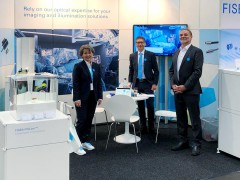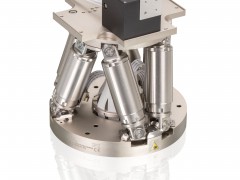
Application Note: Filming 'Killer Cells' in 3D to Aid Immune Response
source:photonics.com
keywords:
Time:2016-01-04
Watching the formation of the human immune system's "killer cells" could help scientists develop new ways to target cancer.
Researchers at Cambridge University used a confocal spinning disk microscope equipped with electron multiplying CCD (EMCCD) cameras to image, in 3D and over a period of time, how immunological synapses form within cytotoxic T lymphocytes as the cells prepare to attack.

Researchers at Cambridge University used a confocal spinning disk microscope equipped with electron multiplying CCD (EMCCD) cameras to image, in 3D and over a period of time, how immunological synapses form within cytotoxic T lymphocytes as the cells prepare to attack.
The equipment included the Revolution microscope and iXon EMCCD cameras from Andor Technology Ltd. of Belfast, Northern Ireland, as well as the company's Imaris software.
"The insights provided by this level of three-dimensional dynamic imaging will allow us to understand the molecular mechanisms that control killer cells, and hold out the hope for improved cancer treatments," said Geraint Wilde, microscopy systems product manager at Andor. "In elucidating the changes inside these cells that lead to killing, researchers will be able to find out why killer cells cannot control some cancers. In time you would then hope to be able to identify ways in which killer cells can be made more effective."
Cambridge
Professor Gillian Griffiths (center) and group members Alex Ritter and Yukako Asano with the Revolution microscope. Courtesy of Cambridge University.

"This is the first time that this process has been captured in 3D," said Cambridge professor Gillian Griffiths.
Killer cells previously were imaged in two dimensions, Griffiths said, which made it impossible to clearly discern events inside them. The new microscope system captures three dimensions and adds the dimension of time. It enabled capture of images across the entire lymphocyte cell, visualizing the changes inside the cells that enable them to kill, with a spatial and temporal resolution not seen before, the researchers said.
The team described their work most recently in Immunity (doi: 10.1016/j.immuni.2015.04.013).
Andor, a subsidiary of Oxford Instruments PLC, produces microscopy systems and scientific cameras for a range of optical microscopy techniques, including photobleaching, activation, conversion and ablation, total internal reflection fluorescence microscopy, white light spinning disk confocal, calcium ratio imaging, comet assay and bioluminescence.
MOST READ
- RoboSense is to Produce the First Chinese Multi-beam LiDAR
- China is to Accelerate the Development of Laser Hardening Application
- Han’s Laser Buys Canadian Fiber Specialist CorActive
- SPI Lasers continues it expansion in China, appointing a dedicated Sales Director
- Laser Coating Removal Robot for Aircraft
PRODUCTS
 FISBA exhibits Customized Solutions for Minimally Invasive Medical Endoscopic Devices at COMPAMED in
FISBA exhibits Customized Solutions for Minimally Invasive Medical Endoscopic Devices at COMPAMED in New Active Alignment System for the Coupling of Photonic Structures to Fiber Arrays
New Active Alignment System for the Coupling of Photonic Structures to Fiber Arrays A new industrial compression module by Amplitude
A new industrial compression module by Amplitude Menhir Photonics Introduces the MENHIR-1550 The Industry's First Turnkey Femtosecond Laser of
Menhir Photonics Introduces the MENHIR-1550 The Industry's First Turnkey Femtosecond Laser of Shenzhen DNE Laser introduced new generation D-FAST cutting machine (12000 W)
more>>
Shenzhen DNE Laser introduced new generation D-FAST cutting machine (12000 W)
more>>
